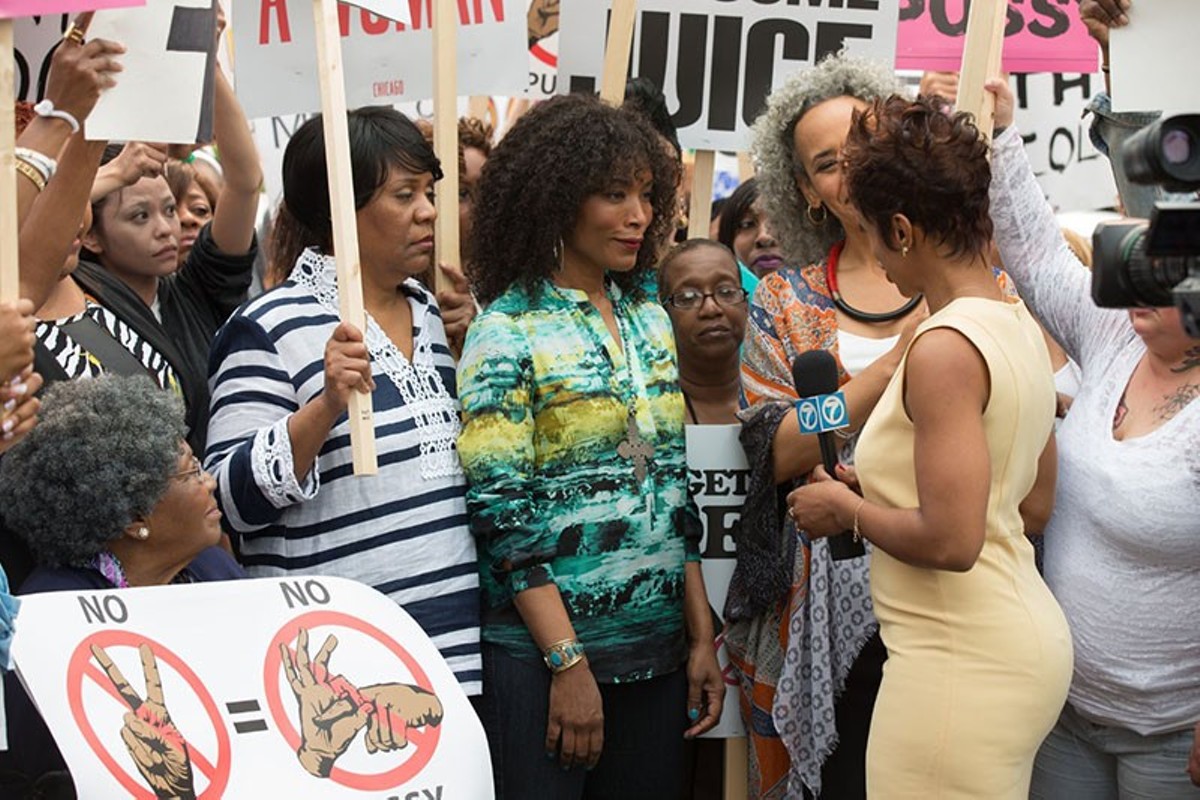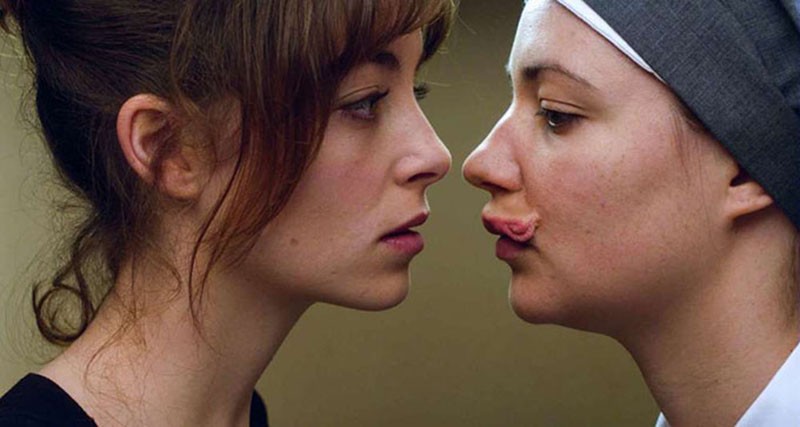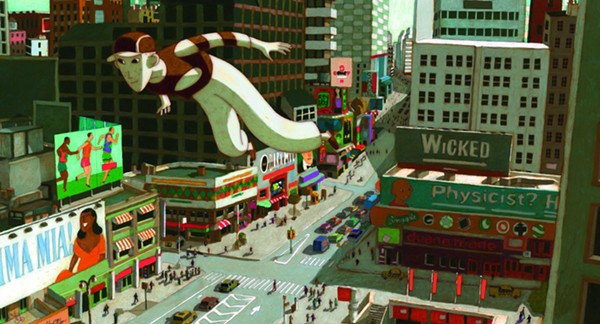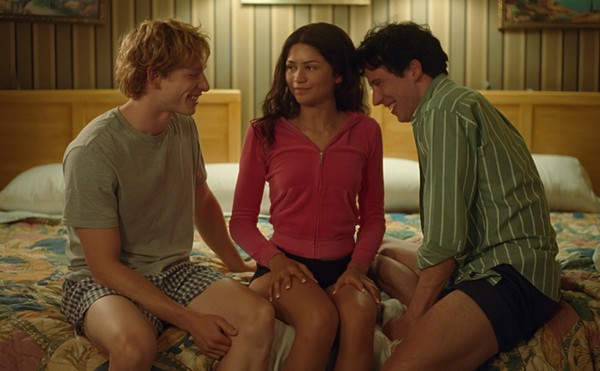If the St. Louis International Film Festival has a single distinctive feature, it is abundance. When the first festival was held in 1992, it used a single screen and presented only 25 films — three per day, with an additional two matinees on weekends — so it was theoretically possibly to see every single program. (Only one person did.) This year, the festival offers hundreds of films in eleven locations, making it difficult to keep track of the schedule, let alone attend more than a fraction of the screenings. Trying to review even a small number of festival offerings is an exercise in randomness, guided by availability, personal taste and the limits of time. With that proviso, here are thoughts on a few programs from the festival's final five days.
My Life as a Film: How My Father Tried to Capture Happiness
7 p.m. Wed., Nov. 9.
Hi-Pointe Backlot
The compulsive filmmaker who spends every minute of his waking life with a camera on his shoulder — Jean-Pierre Leaud's character in Last Tango in Paris, say, or the protagonist of the underground classic David Holzman's Diary — was something of a comic stereotype in the heady days of the New Wave. The German actor-director Joschy Scheidegger was the real-life counterpart to that image, compulsively filming every aspect of his family as they grew up around him. According to his family, Scheidegger wasn't very good about expressing intimacy and thought that his relentless recording would somehow establish a bond between them. In reality, it had the reverse effect, alienating his children and making Scheidegger even more emotionally isolated. When he died in 2012, his daughter Eva Vitija took it upon herself to dive into the hours and hours of film and video and volumes of photos and diaries that had overshadowed their relationship, looking for the real portrait of her family hidden within his archive. Her search through this semi-shared past brought new discoveries, not all of them welcome — including mistresses and a troubled family from an earlier marriage, whose only survivor, Vitija's half-brother, feels no lost love for the father. My Life as a Film begins as a semi-indulgent look at a self-indulgent life but slowly mutates into something else, a psychological mystery with a surprisingly warm conclusion.
Harold and Maude
8 p.m. Wed., Nov. 9.
Delmar Hall
A long-time staple of repertory houses back in the dark P.N. (pre-Netflix) era, usually as a double feature with the now justly forgotten King of Hearts, Harold and Maude is a sick joke rendered with greeting-card sweetness, a black comedy that teeters close to morbid sentimentality but remains defiantly endearing. The premise is simple: Twenty-year-old Harold (Bud Cort) falls in love with 79-year-old Maude (Ruth Gordon). He's morbid, obsessed with death (his hobbies include staging fake suicides and attending funerals), while she's unassailably cheerful. Written by Colin Higgins and expertly directed by Hal Ashby (this was his second film), Harold and Maude succeeds by refusing to compromise, never viewing its characters through the patronizing eyes of normality.
Cosmos
12:10 p.m. Fri., Nov. 11; 7:15 p.m. Sun., Nov. 13.
Landmark Plaza Frontenac Cinema
The likely winner of the "What the Hell Was That?" award, should the festival decide to give one, Cosmos is the first film in fifteen years from the Polish director Andrzej Zulawski and also his last (he died last February). Based on a 1965 novel by Witold Gombrowicz, it's the story of two young men who take a break in the country to get away from their daily responsibilities and fall into a mad tea party disguised as a bed-and-breakfast, inhabited by a cartoonish family that includes a word-twisting banker, a lovesick maid and a pair of newlyweds. Meanwhile, a mystery unfolds: Someone is hanging objects on strings in the nearby woods: first a bird, then a block of wood, then a cat. The household unites to uncover the source of the Calderesque villain, indulge various romantic entanglements and generally act like cartoon characters suddenly pushed into the real world. (Actor Jonathan Genet does a mean Donald Duck imitation). Played broadly and loudly — Zulawski reportedly told Genet he was inspired by The Big Bang Theory — it's a puzzling, boisterous philosophical comedy, sometimes too puzzling and too boisterous.
Chi-Raq
7 p.m. Fri., Nov. 11.
Missouri History Museum
Inspired by the appalling rise of gun violence in Chicago (and most of the nation), Spike Lee's Chi-Raq adapts Aristophanes to show modern day Lysistratas staging an abstinence protest in order to get rival gangs, the Spartans and Trojans, to stop the violence. Told in rhyme and exaggerating its theatrical roots — Samuel L. Jackson steals the show as the chorus, Dolmedes — Chi-Raq is very broad yet deeply felt, archetypal yet painfully familiar. Shot at a fast pace with an all-star cast (Angela Bassett, Wesley Snipes, John Cusack, Jennifer Hudson), it's Spike Lee's richest and most ambitious film in years. This is powerful broadside filmmaking, cinematic activism at its strongest.
Phantom Boy
2:15 p.m. Sat., Nov. 12.
Washington University-Brown Hall
The new film from the makers of A Cat in Paris, Phantom Boy is an odd pseudo-noir crime fantasy with a look borrowed from some the more recent Batman cartoons and a story that plays like an Inspector Gadget spin-off written by M. Night Shyamalan. Leo is a young boy suffering from an unnamed illness who discovers that he can leave his body and float through walls. When a Joker-like villain called The Face takes over New York City's electrical system, Leo collaborates with a hospitalized policeman and uses his powers to scour the city at night looking for the bad guy's lair. As animated films go, Phantom Boy isn't particularly ambitious, although the New York backgrounds are impressively designed. It's silly, contrived stuff, more light-gray than noir, but young audiences should enjoy it.
The Nutty Professor
2:15 p.m. Sat., Nov. 12.
Webster University's Moore Auditorium
The highlight of Jerry Lewis' career as director and actor, The Nutty Professor is Lewis' most ambitious statement on the life of a performer. It's a comic variation on Robert Louis Stevenson in which Mr. Hyde, under the name Buddy Love, turns out to be the hippest, most popular and most egotistical guy in the room, while mild-mannered scientist Julius Kelp finds that the magic formula to improve his social status just pushes him even lower. The next time someone questions why Lewis is regarded as a great filmmaker (and not just in France), show them this film's lengthy, perfectly crafted transformation sequence. It's an elaborate balance of horror and comedy that begins with the German Impressionist scene in Kelp's lab (inspired by MGM's 1951 version of Dr. Jekyll), which leads to a carefully controlled, objective shot that brings the alter-ego to the streets (with a delayed punchline), leading finally to a blitz of quick sight gags revealing Love's entry into the world. With some of Lewis' best visual comedy and his most sharply pointed performance, this is inventive and innovative comic filmmaking at its best.
Despite the Falling Snow
Directed by Shamim Sarif
5:45 p.m. Sat., Nov. 12.
Landmark Tivoli Theatre
Despite the Falling Snow begins with a defection to the U.S. by rising young Kremlin diplomat Alexander, who is forced to abandon his young wife Katya (Rebecca Ferguson). Decades later, the aging Alexander (now played by Charles Dance) tries to discourage his young niece (also Ferguson, because that's how movie genetics work sometimes) from visiting Moscow. Accompanied by a semi-mysterious journalist, she uncovers what really happened to Katya, who was also a double agent. Shamim Sarif's film (based on her novel) has the feel of a vanity project, with arbitrary flashbacks, superficial politics and plot holes big enough to swallow the Red Square. It's an attractively photographed but awkwardly written, structured and directed melodrama, defrosting the last old leftovers of the Cold War to offer the kind of espionage story you might get if John LeCarre had pursued a career writing Harlequin Romance novels.
Bang! The Bert Berns Story
6 p.m. Sat., Nov. 12.
The Stage at KDHX
I spent more than half of the 1960s with a transistor radio glued to my ear and I've done a fair amount of research on the glory days of the Brill Building, but somehow I knew absolutely nothing about producer Bert Berns before seeing Bang! The Bert Berns Story. Although I had undoubtedly seen his name on record labels and sheet music — alone or with partners, he wrote "Twist and Shout," "Piece of My Heart," "Here Comes the Night," "Hang on Sloopy," "A Little Bit of Soap" and many other rock and soul classics — I had only the vaguest recollection of Berns or of Bang Records, the label he started in 1965. How could someone with so many hits, someone who crafted records as memorable as "Baby I'm Yours" and "Brown Eyed Girl," fall through the music-history cracks?
One reason is simple brevity. Berns had rheumatic fever in his youth and wasn't expected to live through his twenties ("Piece of my Heart" was, in a sense, autobiographical); he defied the odds and lived to 38, spending only a brief seven years in the record business. Even so, his last years were overshadowed by both rumors of gangland connections and by the souring of his relationships with business partners Jerry Wexler and Ahmet and Nesuhi Ertegun. Bang! The Bert Berns Story, co-directed by his son, goes a long way toward giving its subject his deserved place in music history, with endorsements from artists such as Paul McCartney and Keith Richards, and warm recollections from the artists who worked with Berns: Solomon Burke, Ben E. King, Cissy Houston, Wilson Pickett and songwriters Jeff Barry, Ellie Greenwich and Mike Stoller.
Aided by Steven Van Zandt's lively narration, Bang! would have been fine as the usual reverent collection of TV clips and memorabilia, but it digs deeper, using a large audio collection of demos, outtakes and rare tracks to show exactly how Berns and his collaborators put together all of those great seven-inch pieces of his heart. If you're indifferent to the charms of mid-'60s top 40, Bang! may tell you far more than you want to know about the ins and outs of record distribution and the secret history of the Strangeloves' "I Want Candy." For others, it's a jukebox of wonders, a 95-minute hit parade.
Elle
5 p.m. Sun., Nov. 13.
Landmark Plaza Frontenac Cinema
Director Paul Verhoeven is nothing is not a provocateur. Remember the plague-ridden dog's head in the soup in Flesh and Blood? Sharon Stone's peep-show greeting in Basic Instinct? All 131 minutes of the hallucinatory freak show that was Showgirls? It doesn't take long for his new film Elle to show that Verhoeven is still determined to outrage. In the first 30 minutes or so, its heroine Michele (Isabelle Huppert) is raped, has a plate of food thrown onto her lap by a complete stranger, argues with her mother about the older woman's many boyfriends, deliberately destroys the front end of her lover's car, and masturbates while watching a neighbor hang up Christmas decorations. Yes, Verhoeven loves to shock, but — and I know this sounds hard to believe — he's up to something else in this film, although it's not always clear exactly what that might be. It's a complex mystery, a revenge film, a Buñuelian comedy and a dark psychological drama, all held together by a magnificent performance by Huppert. Verhoeven's previous films have been accused — sometimes rightly — of casual misogyny and sexual exploitation, but Elle turns his earlier efforts upside down and allows Huppert to fight back on every front. It's not always easy to watch, but probably needs to be seen more than once.
Daughters of the Dust
8 p.m. Sun., Nov. 13.
Landmark Tivoli Theatre
One of the biggest successes of the first St. Louis International Film Festival in 1992 (along with Shakes the Clown), Julie Dash's Daughters of the Dust remains one of the inimitable landmarks of African-American cinema, as difficult to classify as it is to describe. Set at the beginning of the twentieth century, it takes place on St. Helena Island off the coast of South Carolina, where the residents, the Gullah, are descendants of West African slaves and have developed their own unique community and dialect. As the film begins, two women from a large Gullah family, the Peazants, have migrated to the mainland and return to convince their relatives to join them. The film is, in a sense, a non-narrative version of the discussions that follow — even the unspoken ones. Narrated by the spirit of an unborn child and complemented by the thoughts of the elderly, matriarchal Nana Peazant, who is determined to remain on the island, Daughters of the Dust is a scrapbook of family history and customs, a communal sharing of emotions and dim memories. Dream-like and lyrical, like Terence Malick in his earlier, less portentous days, it seems at times more like a dance film than a period piece; the characters gracefully respond to the space around them, always in motion, both physically and spiritually.








